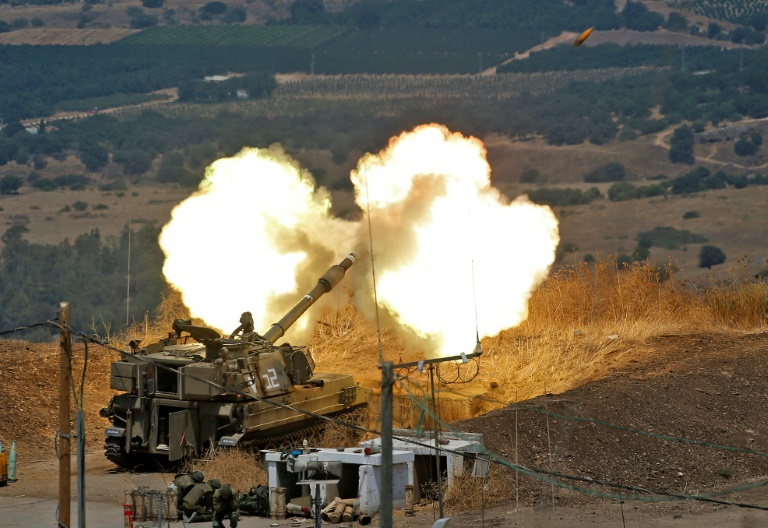Lebanon’s Hezbollah fired a volley of rockets at Israeli positions on Friday, prompting retaliatory shelling, in an escalation between the Iran-backed Shiite movement and the Jewish state.
A flare-up along the border this week has seen Israel carry out its first air strikes on Lebanese territory in seven years and Hezbollah claim a direct rocket attack on Israeli territory for the first time since 2019.
The exchanges coincide with rising tensions between Iran and Israel since a deadly attack on an Israeli-managed tanker in the Gulf of Oman last week.
Following Friday morning’s exchange Israel said it did “not wish to escalate to a full war”, as the United Nations peacekeeping force in the border region, UNIFIL, warned of “a very dangerous situation” and called on parties to “cease fire and maintain calm”.
Hezbollah said it fired dozens of rockets at open ground near Israeli positions in the disputed Shebaa Farms border district.
It said the attack came in response to Israeli air strikes on south Lebanon on Thursday that were the first since 2014.
An AFP correspondent in south Lebanon said he heard several explosions and saw smoke rising from around the Shebaa Farms.
Israel said 19 rockets were fired, six of which hit Israeli ground.
Three fell short while the others were intercepted by air defences, it said.
The Israeli military released a video of multiple vapour trails in the skies, and said it was “striking the launch sources in Lebanon” but did not elaborate.
– Rocket launcher confiscated –
UNIFIL reported an “artillery response from Israel in the Shebaa Farms area”, following the Hezbollah rocket attack.
An AFP correspondent in south Lebanon reported artillery fire by Israeli forces on the Shebaa Farms and outside the town of Kfarchouba.
The Shebaa Farms district is claimed by Lebanon but the UN regards it as part of the Syrian Golan Heights, which Israel has occupied since 1967 and unilaterally annexed in 1981.
Israeli army spokesman, Amnon Shefler, played down the prospects of all-out war with Hezbollah.
“We believe that neither Hezbollah wants a full-out war, and we definitely do not wish to have a war,” he said after Friday’s exchange.
“Yet of course we are very prepared for that.”
He said life continued as normal on the Israeli side of the border.
Hezbollah’s deputy head, Naeem Qassem, said the group was committed to responding to any attack on Lebanon.
But “we do not believe things are headed towards an escalation, though Hezbollah is prepared” if needed, he added.
In the south Lebanon district of Hasbaya, Druze villagers earlier stopped a truck carrying a multiple rocket launcher used by Hezbollah in Friday’s attack, a military source told AFP.
A video widely shared on social media showed angry residents blocking the truck’s passage and accusing Hezbollah of endangering civilian lives by launching rockets from close to residential areas.
Hezbollah said the truck was stopped after the group’s attack but that the rockets were fired far from residential areas.
The Lebanese army said it arrested the four people who had launched the rockets and seized the launcher after it was intercepted by villagers.
– ‘Escalation’ –
A series of rocket attacks have been launched from Lebanon towards Israel since Wednesday, but with the exception of Friday’s salvo, they have remained unclaimed.
Before Thursday, Israel’s last air strikes on Lebanon dated back to 2014 when warplanes struck territory near the Syrian border.
They had not targeted Hezbollah’s south Lebanon strongholds since the militants fought a devastating conflict with Israel in 2006.
For its part, Israel has repeatedly warned it will not allow a power vacuum and a deepening economic crisis in Beirut to undermine security on its border.
The Israeli military has said it “views the state of Lebanon as responsible for all actions originating in its territory”.
Lebanon is grappling with an economic crisis that the World Bank says is one of the world’s worst since the mid-19th century.
Despite international pressure, political leaders have failed to form a government since the outgoing cabinet resigned after a deadly blast last year at the capital’s port.











